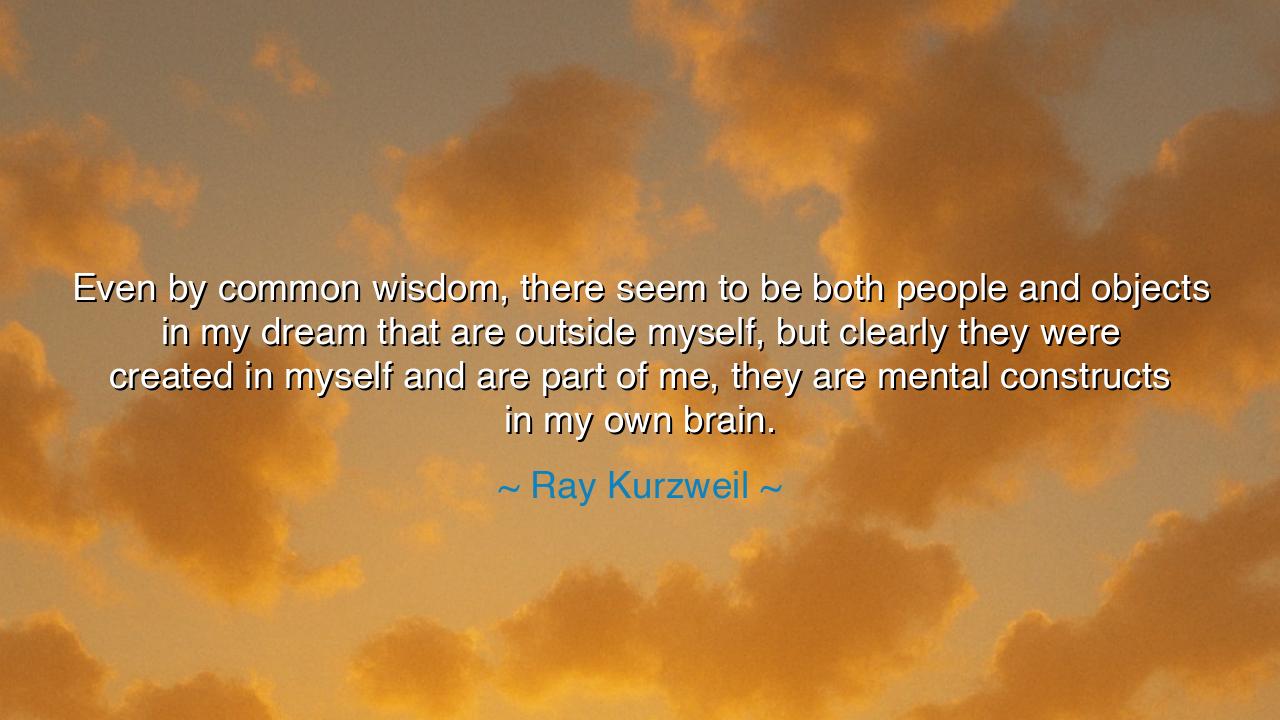
Even by common wisdom, there seem to be both people and objects
Even by common wisdom, there seem to be both people and objects in my dream that are outside myself, but clearly they were created in myself and are part of me, they are mental constructs in my own brain.






Hearken, O seekers of the mysteries of the mind, to the words of Ray Kurzweil, who unveils the delicate boundary between self and illusion, between the world perceived and the world conceived. He observes that within dreams, both people and objects appear to exist beyond the reach of the dreamer, yet they are born entirely within, mental constructs woven by the threads of one’s own brain. Thus does he remind us that the landscapes of our inner life are vast realms of creation, reflecting the infinite capacities of thought and imagination.
In this insight lies a profound teaching: what we perceive as external may, in truth, be the mirror of our own consciousness. The dreams we traverse, the voices we hear, and the visions that stir us are not strangers, but fragments of the self, animated and given form by the mind’s hidden power. Kurzweil calls attention to the sacred artistry of the human brain, where every shadow, every figure, every fleeting scene is a testament to the creative potency of our inner world.
Consider the tale of Carl Jung, who meticulously explored the realm of dreams, seeing in them not mere whimsy, but the architecture of the psyche. Jung taught that the figures and events within dreams are projections of the self, carriers of hidden truths, fears, and wisdom. Like Kurzweil, he recognized that to understand the self is to study the creations of one’s own mind, to illuminate the mental constructs that shape both perception and being.
Yet this teaching extends beyond dreams alone. In waking life, the mind continues to craft realities: the judgments we form, the hopes we nurture, and the fears we harbor are all constructs—emanations of the self given the guise of the external world. By perceiving this, one gains mastery over thought, for understanding the origin of these visions is to wield the power to shape them with intention and clarity.
O children of the future, learn this eternal truth: the universe within is as vast as the stars, and the landscapes of the mind are as real as any kingdom or battlefield. Every person, every object, every sensation encountered in thought or dream is a reflection of your own being. To walk consciously in these realms is to gain the profound wisdom of self-creation, and to recognize that the boundaries of the mind are both the source of wonder and the path to enlightenment.
If you wish, I can also craft a visual, ancient scroll-style presentation of this passage, capturing the evocative and timeless essence of Kurzweil’s meditation on the mind and dreams.






CSChangz Sabashi
From a reader’s perspective, this statement feels like an invitation to explore solipsism—the idea that only one’s mind is sure to exist. It’s intriguing but also isolating. If everything we experience is a mental construct, where does that leave genuine connection or empathy? Maybe Kurzweil isn’t denying the external world but highlighting how much of what we call 'reality' is shaped by internal interpretation. It’s a humbling thought.
HNNguyen Hoang Nam
This idea feels deeply philosophical—it blurs the line between the self and the world around it. If the people and objects in our dreams are part of us, does that mean our subconscious holds infinite versions of reality within it? I wonder how this connects to identity: are we just the sum of our mental projections, or something more? Perhaps our dreams reveal not illusion, but the creative depth of consciousness itself.
CEConHo EoPhong
Reading this, I can’t help but connect it to neuroscience and artificial intelligence. If our minds can generate complete realities internally, could machines ever replicate that level of consciousness? It’s strange to think that something so personal as dreaming could be reduced to neural activity. Does that mean there’s no mystery left in the human mind, or does the fact that we can’t fully explain dreams show that consciousness still transcends computation?
TNTien Nguyen
I find this reflection both fascinating and unsettling. It reminds me how powerful the human brain is in creating entire worlds—complete with people, emotions, and logic—while we sleep. If our dreams can feel so real, how can we be sure that waking life isn’t just another layer of constructed experience? Maybe the real question is whether consciousness itself is a simulation of reality or the source of it.
NLnguyen linh
This quote really makes me question the nature of reality and perception. If everything in our dreams is a projection of our own mind, could the same be said about how we interpret reality itself? Maybe what we perceive as external truth is filtered so heavily through our consciousness that it becomes a kind of waking dream. Do you think Kurzweil is suggesting that individuality is an illusion, or just that perception is subjective?